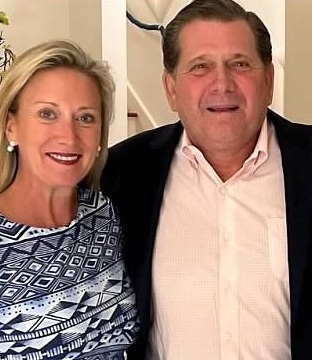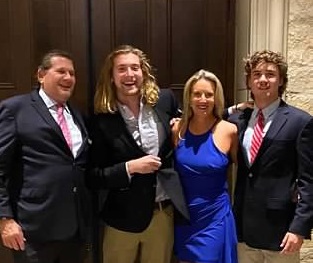The Power and Promise of Early Detection
Topic: Announcement, Hide on Homepage, Real Talk: Survivor, Patient & Family Stories, Your Source for Breaking News & Inspirational Stories

This summer, Cook and Kelly Edens will celebrate their 29th wedding anniversary. They don’t take for granted how blessed they are to reach this milestone, and how circumstances could’ve taken a very tragic turn.
In 2010, Cook’s internist called with the results of his endoscopy for what he and Kelly thought was acid reflux, and luckily the scan showed up clean. However, at the end of their three-way call, after Cook had already hung up, the doctor made a comment that sent chills down Kelly’s spine. “So, in sum, I don’t see anything of concern, but of course, I can’t see his pancreas.”
In one moment, with a single sentence, their lives were irrevocably changed. A friend of Kelly’s had passed away from pancreatic cancer at just 45, so the doctor’s statement terrified her, and she braced for the worst. She sobbed and shook while driving home from her office, and once at home, she immediately called Johns Hopkins, one of the world’s most renowned pancreatic cancer hospitals and research centers, which luckily was located near her home in Virginia. She was able to get an appointment for the following week with Hopkins’ pancreatic cancer team, led by Dr. Chris Wolfgang, who ran a battery of tests on Cook’s pancreas.
However, the test results were inconclusive, and Dr. Wolfgang presented three choices: Cook could wait six months and undergo another round of tests, he could choose to do nothing, or he could have exploratory surgery. Dr. Wolfgang recommended exploratory surgery because his colleague, Dr. Elliot Fishman, had reviewed the scans and said the pancreatic duct was a bit dilated, which was a concerning sign. As Dr. Wolfgang advised, “If something is actually there, we might be able to catch it early, and I rarely get to say that with regard to the pancreas.”
Cook and Kelly were in shock; he was otherwise very healthy and active, only 50 years old with no family history of pancreatic cancer, so how could this be happening? With eight- and six-year-old sons to raise and his life potentially at stake, Cook and Kelly knew the only option was confronting a potential case of cancer and having the exploratory surgery. Dr. Wolfgang unfortunately discovered Stage I pancreatic cancer after performing a Whipple procedure, where the diseased portion of the pancreas, as well as other organs such as the gallbladder, spleen, and duodenum, were removed and his digestive system was reworked. The Whipple procedure provides pancreatic cancer patients with the best chance for a cure, and in Cook’s case, the Whipple procedure, combined with early detection, helped to save his life.
Once Cook healed from this grueling surgery, he persevered through six months of chemotherapy treatment. Following chemotherapy, Cook underwent scans every three months for the next five years to make sure no cancer had returned. Before every scan, Kelly and Cook had a “hold your breath” moment, hoping and praying that Cook would never hear the words, “You have pancreatic cancer” again. Then, in 2015, his medical team felt he should have his entire pancreas removed as a proactive measure to ensure cancer couldn’t return. He underwent a complete pancreatectomy in January 2016, instantly making him a diabetic. And, while diabetes has presented its own set of challenges, Kelly and Cook are just so relieved to know he made it through the other side of his pancreatic cancer diagnosis. He now goes for yearly scans and thankfully, there has been no evidence of disease.

Now, Cook counsels several pancreatic cancer patients each year through the Johns Hopkins network, giving them hope, comfort, and strength and serving as an example that pancreatic cancer can be a survivable disease. While it’s incredibly painful to relive this experience, helping people “puts the patina over the pain,” as Kelly explains, and has helped Cook with his own healing process.
When Cook was first diagnosed, Kelly felt helpless and hopeless. Doctors said there was just a 40% chance Cook would even live for another two years. There were no pancreatic cancer caregiver support groups and no one she could call who had been through this trauma who she could commiserate with and get advice from. Based on what she went through, Kelly learned a critical lesson she tells all caregivers: Put the oxygen mask on yourself first. Resist the instinct to put everyone else first; otherwise, you won’t be equipped to help others. She also recommends making time for a hobby where you can set aside all of the intense emotions and struggles inherent in caring for a loved one with a life-threatening disease. For her, running and gardening provided a much-needed respite and so much joy. Additionally, work was a lifeline because it filled her “tank of hopelessness.” As an accomplished, resourceful owner of a recruiting firm, she was in the business of changing people’s professional lives, and that was such a gratifying feeling that buoyed her through some very dark days.
Kelly knows there is so much pain involved with being a caregiver that is seldom discussed. In addition to taking care of a loved one and managing all of his medical needs and appointments, Kelly was laser-focused on her sons’ well-being and trying to maintain a level of normalcy in their lives. She assured them their dad was at the “best of the best” hospital but stopped short of telling them he would be okay; that was a promise that she could not keep, and it was heart-breaking. She also had to contend with her own fear and anxiety over the possibility she could lose her husband. She was so grateful for her support network of close friends and relatives who rallied around their family, nurturing them with love and hope. Pancreatic cancer wouldn’t—couldn’t—break their family; in fact, it brought them closer and made them even more united and resilient.
Kelly’s friend Colleen Avis, the lead author of Sacred Spaces Volume 2, Subtle Shifts for Mind, Body, and Home Transformation(available in paperback/e-book on Amazon) asked Kelly to write a chapter in her book because she had such a powerful and impactful story to tell. At first, Kelly was very reluctant. As a self-described “lacrosse mom” and a successful recruiter, being a writer wasn’t a skill she considered part of her wheelhouse. However, one day she sat down at her dining room table and, as she explained, she “uncorked the dam” and wrote for 12 hours straight, experiencing a catharsis. Cook burst into tears when he first read Kelly’s chapter (#23) “From Fear to Fierce: Unleashing the Warrior Within” because he was experiencing their pancreatic cancer journey through the perspective of a devoted caregiver, a wife and a mother facing the unthinkable.
In addition to helping others going through a cancer diagnosis with a loved one or another seemingly insurmountable journey, Kelly hopes the courage it took for her to open up about her family’s experience with pancreatic cancer will inspire and empower others to have the fortitude to share their own stories. She and Cook are looking forward to their next chapter—with pancreatic cancer behind them.
Note: Kelly Edens does not financially profit from this book in any way, as all of the proceeds from the sale of the book (less publisher costs) will go to an already identified community charity to help food-insecure and low-income households.

